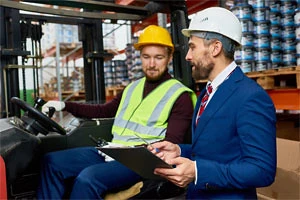Renewing your forklift licence is crucial for maintaining your eligibility to operate safely and legally.
 Legal Requirement
Legal Requirement
Operating a forklift without a valid licence is illegal and unsafe. Renewing your licence ensures you're compliant with regulations and equipped with the necessary skills to operate a forklift responsibly.- Employment Opportunities
Many employers require forklift operators to hold a valid licence. By renewing your licence, you maintain your employability and open doors to job opportunities in various industries.
Convenient Ways to Renew Your Forklift Licence
Renewing your forklift licence doesn't have to be complicated. Here are some convenient methods to ensure a smooth renewal process.
- Online Renewal
Many licensing authorities offer online renewal options, allowing you to renew your forklift licence from home. Visit the licensing authority's website, complete the renewal form, and submit the necessary documentation. - In-Person Renewal Courses
If you like hands-on learning, consider enrolling in an in-person renewal course. These courses typically cover essential safety updates and provide practical skills assessment opportunities. Check with your local training provider for available course options.
Tips for a Successful Licence Renewal
To ensure a successful licence renewal, consider the following tips:
- Plan Ahead
Be sure to renew your forklift licence before the last minute. Begin the renewal process in advance to prevent any delays or complications. - Update Your Skills
Take this opportunity to update your forklift operating skills. Consider attending refresher training courses to improve your knowledge and stay updated with the industry's best practices.
The Renewal Process
How to Apply for Licence Renewal
-
Find Your State's Licensing Office: Each Australian state has its own office (like WorkSafe or SafeWork) where you apply for your forklift licence renewal. Start by identifying the correct office for your state.
-
Gather Required Documents: Before you apply, make sure you have all necessary documents ready. This typically includes your current forklift licence, identification, and any proof of completed training courses.
-
Complete the Renewal Application: Fill out the renewal application form. This can usually be found on your state's WorkSafe or SafeWork website. Make sure all information is correct and complete.
-
Submit Your Application: Submit your application along with the required documents. You can do this online through the website of your state's licensing office or in person, depending on what your state allows.
-
Pay the Renewal Fee: You'll need to pay a fee to renew your licence. The amount and payment options will be provided during the application process.
Renewal Fees and Payment
-
Fees: The cost to renew your forklift licence can vary by state. It's important to check the specific fee on your state's WorkSafe or SafeWork website.
-
Payment Methods: Payment can often be made online using credit or debit cards. Some states may also accept other forms of payment like bank transfers or in-person payments at designated offices.
This simplified guide will help you through the process of renewing your forklift licence in Australia, ensuring you stay compliant and can continue working without interruption.
Renewing Your License Does Involve Taking Written and Practical Tests
Renewing your forklift license necessitates the completion of both theoretical and practical evaluations, ensuring operators' proficiency aligns with contemporary safety and operational standards. Here’s a detailed explanation with technical specificity:
-
Theoretical Examination: This assessment gauges an operator's comprehension of forklift mechanics, safety regulations, and operational theory. It encompasses a range of topics, including the principles of load dynamics (understanding load center and its impact on forklift stability), legislative obligations under workplace health and safety acts, and the identification and mitigation of occupational hazards specific to forklift operation.
-
Practical Assessment: The hands-on evaluation tests an operator's skill in executing forklift operations in compliance with standardized safety protocols. This involves conducting a thorough pre-operational check of the forklift to assess its serviceability, including inspection of mast, forks, brakes, steering, and hydraulic systems. Operators must then navigate a designated course that simulates workplace scenarios, demonstrating proficiency in load manipulation, stacking at various heights, and safe navigation of pedestrian and vehicular traffic zones.
These evaluations are integral to verifying that forklift operators possess the necessary knowledge and skills to operate machinery safely, minimizing the risk of accidents and enhancing overall workplace safety.



